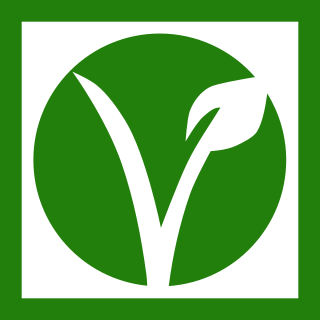
Veganism is the practice of abstaining from the use of animal products—particularly in diet—and an associated philosophy that rejects the commodity status of animals. A person who follows the diet or philosophy is known as a vegan.
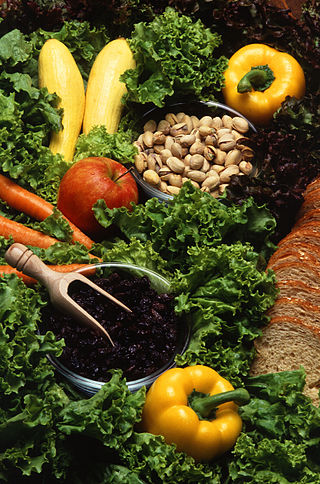
Vegetarian cuisine is based on food that meets vegetarian standards by not including meat and animal tissue products.

Soap is a salt of a fatty acid used in a variety of cleansing and lubricating products. In a domestic setting, soaps are surfactants usually used for washing, bathing, and other types of housekeeping. In industrial settings, soaps are used as thickeners, components of some lubricants, and precursors to catalysts.
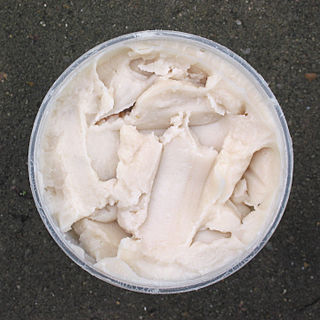
Animal fats and oils are lipids derived from animals: oils are liquid at room temperature, and fats are solid. Chemically, both fats and oils are composed of triglycerides. Although many animal parts and secretions may yield oil, in commercial practice, oil is extracted primarily from rendered tissue fats from livestock animals like pigs, chickens and cows. Dairy products yield animal fat and oil products such as butter.

Vegetable oils, or vegetable fats, are oils extracted from seeds or from other parts of fruits. Like animal fats, vegetable fats are mixtures of triglycerides. Soybean oil, grape seed oil, and cocoa butter are examples of seed oils, or fats from seeds. Olive oil, palm oil, and rice bran oil are examples of fats from other parts of fruits. In common usage, vegetable oil may refer exclusively to vegetable fats which are liquid at room temperature. Vegetable oils are usually edible.
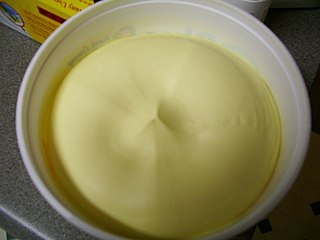
Margarine is a spread used for flavoring, baking, and cooking. It is most often used as a substitute for butter. Although originally made from animal fats, most margarine consumed today is made from vegetable oil. The spread was originally named oleomargarine from Latin for oleum and Greek margarite. The name was later shortened to margarine.
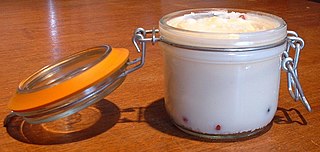
Tallow is a rendered form of beef or mutton suet, primarily made up of triglycerides.
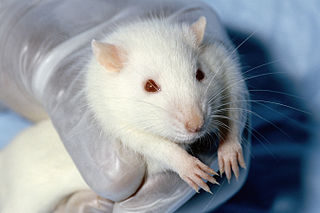
In the animal rights movement, cruelty-free is a label for products or activities that do not harm or kill animals anywhere in the world. Products tested on animals or made from animals are not considered cruelty-free, since these tests are often painful and cause the suffering and death of millions of animals every year.
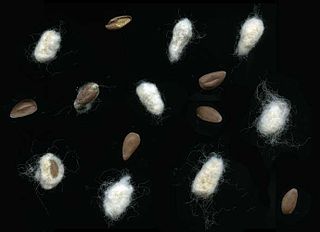
Cottonseed oil is cooking oil from the seeds of cotton plants of various species, mainly Gossypium hirsutum and Gossypium herbaceum, that are grown for cotton fiber, animal feed, and oil.
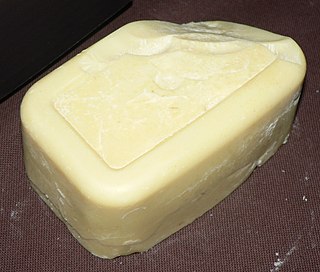
Cocoa butter, also called theobroma oil, is a pale-yellow, edible fat extracted from the cocoa bean. It is used to make chocolate, as well as some ointments, toiletries, and pharmaceuticals. Cocoa butter has a cocoa flavor and aroma. Its melting point is slightly below human body temperature. It is an essential ingredient of chocolate and related confectionary products. Cocoa butter does not contain butter or other animal products; it is vegan.
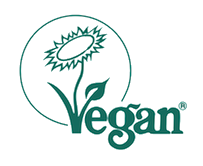
The Vegan Society is a registered charity and the oldest vegan organization in the world, founded in the United Kingdom in 1944 by Donald Watson, Elsie Shrigley, George Henderson and his wife Fay Henderson among others.

Saponification value or saponification number represents the number of milligrams of potassium hydroxide (KOH) or sodium hydroxide (NaOH) required to saponify one gram of fat under the conditions specified. It is a measure of the average molecular weight of all the fatty acids present in the sample in form of triglycerides. The higher the saponification value, the lower the fatty acids average length, the lighter the mean molecular weight of triglycerides and vice versa. Practically, fats or oils with high saponification value are more suitable for soap making.
In chemistry, acid value is a number used to quantify the acidity of a given chemical substance. It is the quantity of base, expressed as milligrams of KOH required to neutralize the acidic constituents in 1 gram of a sample. The acid value measures the acidity of water-insoluble substances like oils, fats, waxes and resins, which do not have a pH value.

Lush Retail Ltd. is a British cosmetics retailer which is headquartered in Poole, Dorset, United Kingdom. It was founded in 1995 by trichologist Mark Constantine, his wife Mo Constantine and five other founders.
An oil is any nonpolar chemical substance that is composed primarily of hydrocarbons and is hydrophobic and lipophilic. Oils are usually flammable and surface active. Most oils are unsaturated lipids that are liquid at room temperature.

An animal product is any material derived from the body of a non-human animal. Examples are fat, flesh, blood, milk, eggs, and lesser known products, such as isinglass and rennet.
Oleochemistry is the study of vegetable oils and animal oils and fats, and oleochemicals derived from these fats and oils. The resulting product can be called oleochemicals (from Latin: oleum "olive oil"). The major product of this industry is soap, approximately 8.9×106 tons of which were produced in 1990. Other major oleochemicals include fatty acids, fatty acid methyl esters, fatty alcohols and fatty amines. Glycerol is a side product of all of these processes. Intermediate chemical substances produced from these basic oleochemical substances include alcohol ethoxylates, alcohol sulfates, alcohol ether sulfates, quaternary ammonium salts, monoacylglycerols (MAG), diacylglycerols (DAG), structured triacylglycerols (TAG), sugar esters, and other oleochemical products.
John A. McDougall is an American physician and author. He has written a number of diet books advocating the consumption of a low-fat vegan diet based on starchy foods and vegetables.

Mono- and diglycerides of fatty acids (E471) refers to a naturally occurring class of food additive composed of diglycerides and monoglycerides which is used as an emulsifier. It is also used as a fruit coating agent. This mixture is also sometimes referred to as partial glycerides.

Cooking oil is a plant or animal liquid fat used in frying, baking, and other types of cooking. Oil allows higher cooking temperatures than water, making cooking faster and more flavorful, while likewise distributing heat, reducing burning and uneven cooking. It sometimes imparts its own flavor. Cooking oil is also used in food preparation and flavoring not involving heat, such as salad dressings and bread dips.















